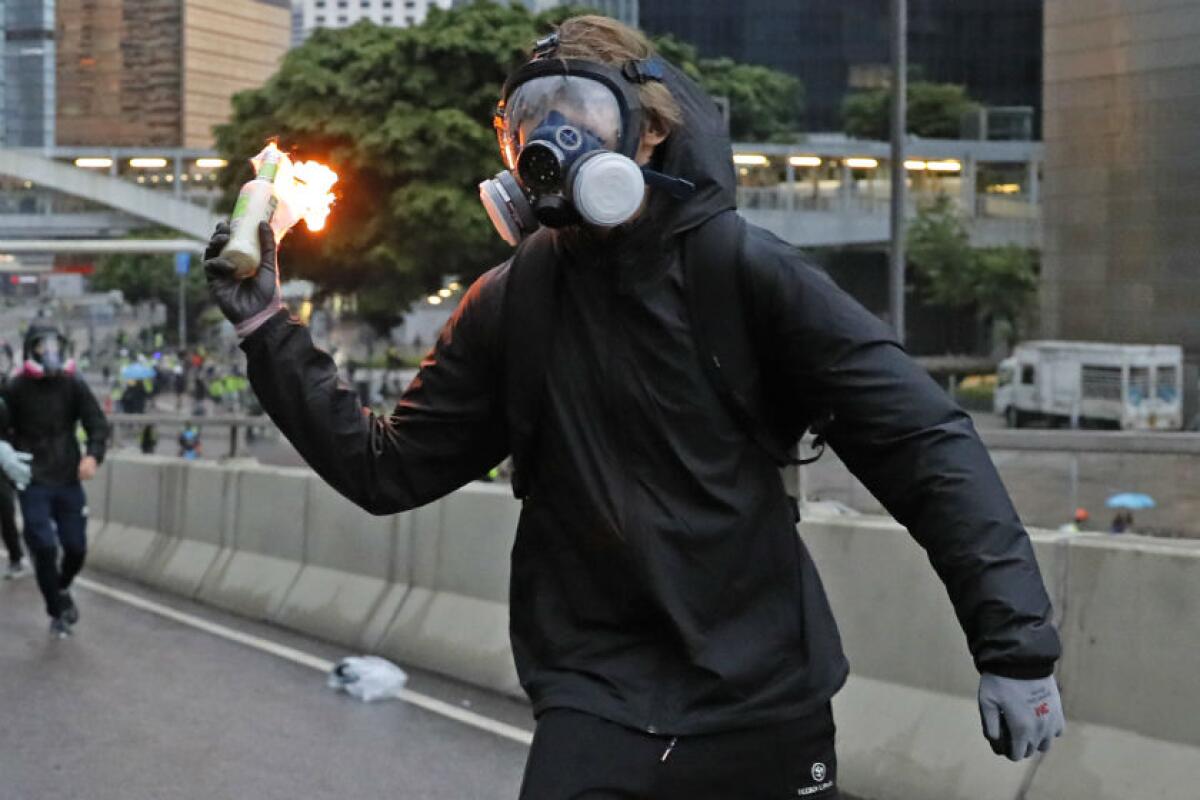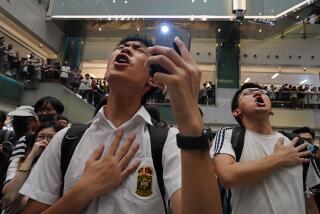News Analysis: ‘Cockroaches’ vs. ‘terrorists’: Can Hong Kong protesters and police dial down the rage?

- Share via
Hong Kong — Police call the demonstrators “cockroaches.”
Protesters call the police “terrorists.”
Three months since unrest began in Hong Kong, the rhetoric has shifted to match a rise in violence, strongly signaling there is little chance the conflict will subside in the near future.
The government in mainland China is unlikely to give ground in its efforts to exercise its authority over the territory. The pro-democracy protesters appear just as committed to their cause.
“I don’t see this ending anytime soon,” said Adam Ni, a China expert at Macquarie University in Sydney. “There’s a hardening of attitude on both the side of the protesters and the authorities in Beijing and Hong Kong respectively. Nobody is willing to entertain some kind of compromise.”
He said it’s “all adding up to escalation, a cycle of violence and a cycle of antagonism.”
The deepening acrimony was on display again Sunday as protesters halted the express train to the Hong Kong international airport by throwing objects on the track and used luggage carts and street signs to build barricades around the airport and block police from entering.
Flights were delayed as riot police moved in and protesters fled.
They regrouped at nearby Tung Chung subway station, where they scribbled graffiti, broke counter windows, smashed CCTV cameras, flooded the floor with a fire hose and set fire to a barricade.
At one point, protesters burned the Chinese national flag, a red line sure to rouse anger in China, where state media condemn the protesters as secessionists, mobsters, rioters and criminals. Authorities have further raised tensions by moving troops close to the Hong Kong border.
The continuing mayhem follows a Saturday night in which police went to new extremes in violence in their efforts to contain the protest movement.
At the Prince Edward Mass Transit Railway Station, they beat and pepper sprayed protesters who were not offering resistance.
Public outrage ensued, and it was only exacerbated by video circulated on social media Sunday showing a policeman at the airport beating a protester who was lying down, not fighting back.
Man-Kei Tam, the Hong Kong director for Amnesty International called the railway station beatings “horrifying” and said “such unlawful police tactics continue to inflame rather than de-escalate the situation.”
Indeed, the violent crackdown by police seems only to have strengthened demonstrators’ resolve, giving them a moral upper hand that has increased their popular support.
“Hong Kong people will not give up,” said David Cheung, a Christian pastor who joined Sunday’s protest at the airport. “The government wants to scare them to make them give up. This government is a moral decay government and people are really angry.”
He said he said he came out to protest at the airport to show his support for the protesters.
“I know what they’re doing and I appreciate it and support it because Hong Kong is under attack by terror,” he said. “People just fight for freedom.”
Another protester, who gave only his surname, Chan, compared police to gangsters with an important exception: “Unlike gangsters police possess real power, but they abuse it and use it to attack people instead of to protect them. They are not a real police force.”
Recognizing the danger of widespread public scorn, Simon Southgate, an assistant police commander, told the local press that he has ordered his officers not to refer to protesters as cockroaches.
“No matter how violent or unlawful the protesters’ behavior may be, it is not worth officers getting into trouble by using the term cockroach — in verbal communication, on the radio or even social media,” he said.
It was mistreatment by police that helped transform popular opposition to an extradition bill — which would have allowed criminal suspects from Hong Kong to be tried in mainland China — into a broad movement against Beijing’s exercise of power in the territory.
The increasingly violent tactics by police have also served to justify violence by some protesters.
“I understand why some protesters resorted to [throwing Molotov cocktails] after how the police behaved,” said a 27-year-old woman who did not want to be identified because she had participated in illegal demonstrations.
She was quick to add: “I don’t support it and I don’t think most ordinary protesters would do this.”
Public anger has also been fueled by the recent arrests of prominent activists, including Joshua Wong, who led the pro-democracy Umbrella Movement in 2014.
Back then, protesters demanding the right to elect their own political leaders occupied the central streets of Hong Kong for more than two months. That effort died with no concessions from Beijing, largely because many Hong Kongers became annoyed with the disruption to their daily lives.
A key question this time is how long the movement will continue to enjoy popular support.
Seizing on the violence committed by some protesters, authorities have tried to portray all the demonstrators as extremists. But the public has shown little sign of fatigue.
The movement has no leaders, and rather than continuously occupying the city, it relies on social media networking to launch periodic demonstrations.
Perhaps most important, popular sentiment — especially among young people — has shifted sharply against Hong Kong’s leadership and Beijing.
Surveys show that most young people in the city do not identify themselves as Chinese but as Hong Kongers.
“That doesn’t bode well for the future of Beijing’s control in Hong Kong,” Ni said.
He said that over the last several years, the Chinese government in essence has a culture in which young people see protest as “reasonable, cool, even socially responsible.”
“A whole generation of young people has grown up with the ethos, the know-how, with the will to protest,” he said.
Times staff writer Alice Su contributed to this report from San Francisco.
More to Read
Sign up for Essential California
The most important California stories and recommendations in your inbox every morning.
You may occasionally receive promotional content from the Los Angeles Times.










